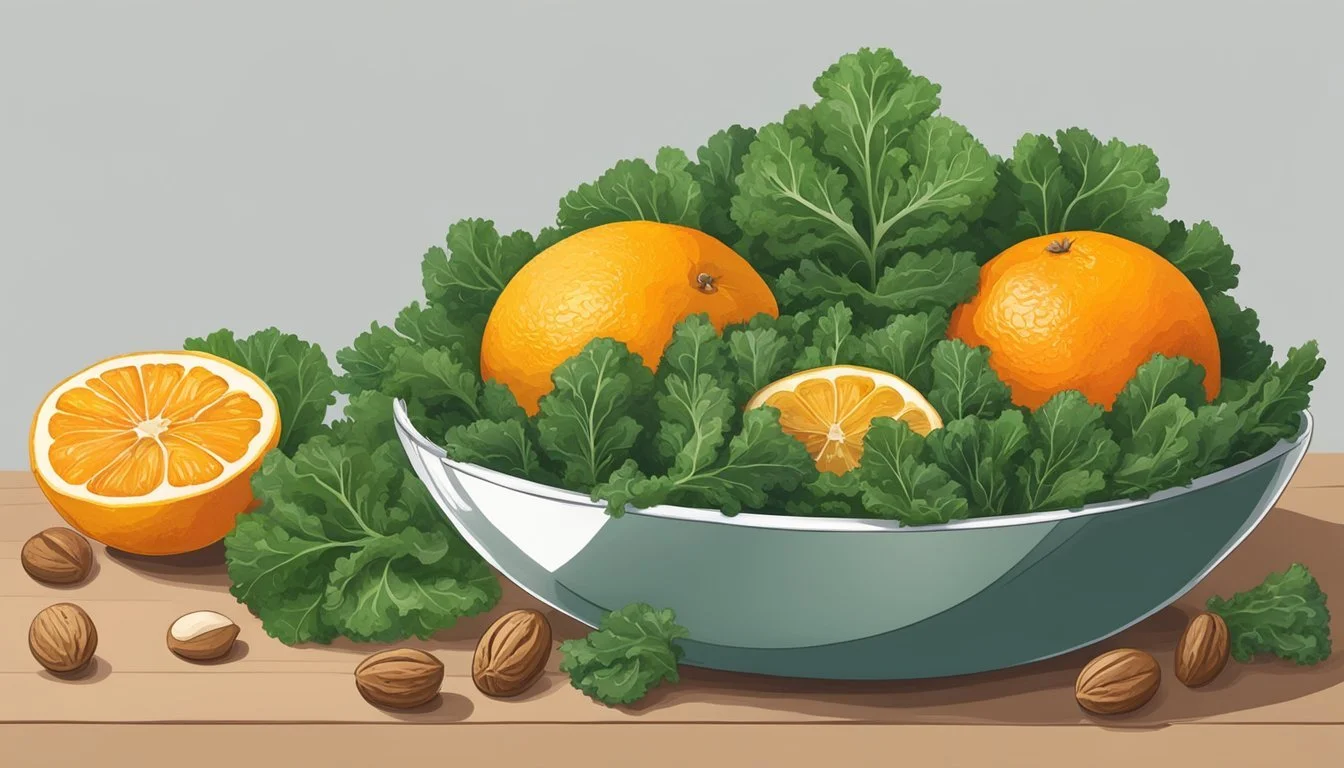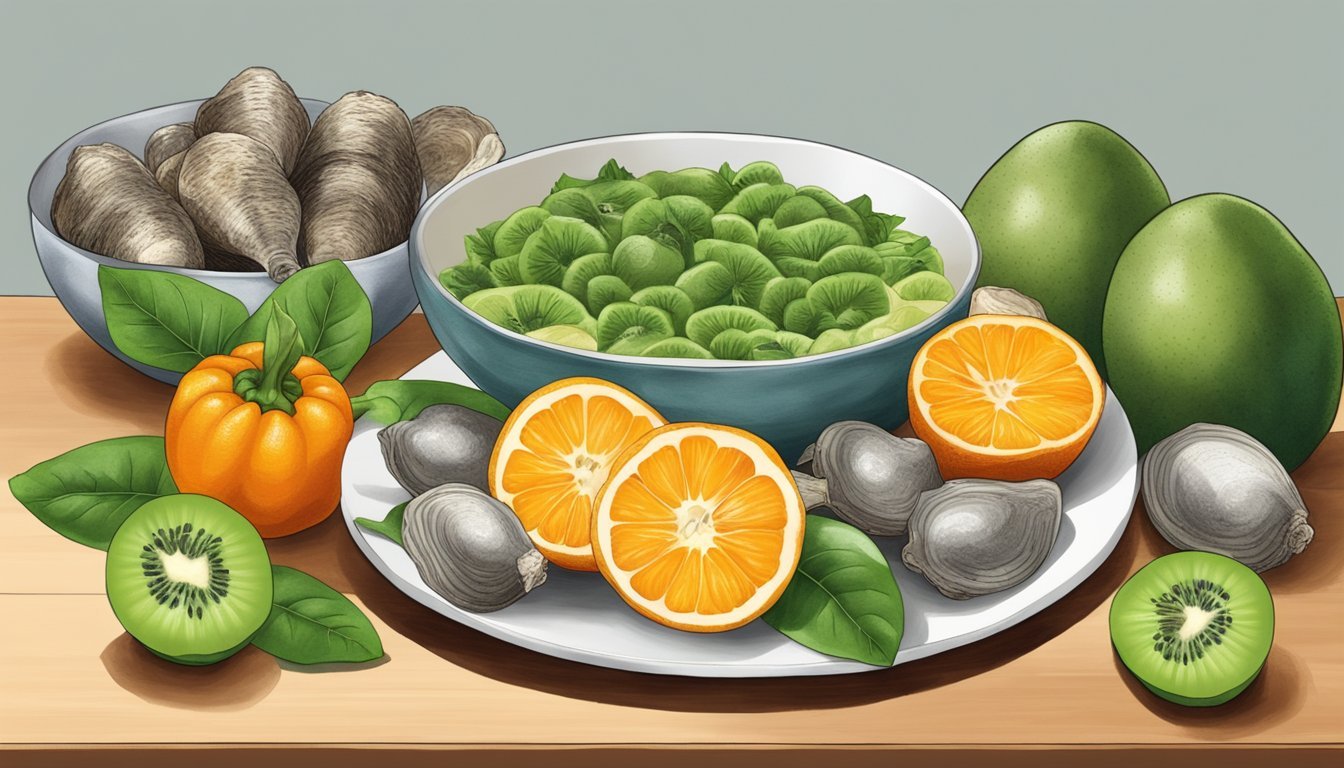Boost Your Immune System
Benefits and Sources Explained
Maintaining a well-balanced diet rich in essential nutrients is crucial for supporting overall health, and two important nutrients to focus on are zinc and vitamin C. These nutrients play vital roles in various bodily functions, including immune system support, skin health, and wound healing.
Incorporating foods high in zinc and vitamin C can help ensure that your body functions optimally and stays resilient against infections. By understanding the benefits of these nutrients and knowing which foods are rich sources, individuals can make informed dietary choices that contribute to their well-being.
1) Oysters
Oysters are an excellent source of zinc and vitamin B12. Consuming just a small quantity of oysters can provide more zinc than the recommended daily allowance, which plays a crucial role in maintaining the immune system.
In addition to zinc, oysters are also rich in iron, selenium, and other trace minerals. These nutrients contribute to various bodily functions, such as forming and maintaining healthy bones.
Oysters contain high-quality protein, which is essential for muscle repair and growth. The combination of these nutrients makes oysters a nutritious option for those looking to enhance their diet with foods rich in zinc.
2) Beef liver
Beef liver is a nutrient-dense food high in both zinc and vitamin C. These nutrients play crucial roles in the body’s overall health.
Zinc is essential for immune function and wound healing. Beef liver contains a substantial amount of zinc, which supports various bodily functions.
Vitamin C in beef liver has antioxidant properties, which help reduce oxidative stress and tissue damage. This vitamin boosts the immune system by neutralizing free radicals.
The combination of zinc and vitamin C in beef liver makes it a powerful food for supporting immune health and overall vitality. Consuming beef liver can contribute to these benefits, making it a valuable addition to a balanced diet.
3) Pumpkin Seeds
Pumpkin seeds are a powerhouse of nutrients and an excellent source of zinc. A single ounce (28 grams) of raw pumpkin seeds provides approximately 2.1 milligrams of zinc. Zinc plays a critical role in immune function, making pumpkin seeds a beneficial addition to the diet.
In addition to zinc, pumpkin seeds are rich in other minerals. They contain magnesium, iron, phosphorus, and copper. These minerals contribute to overall health by supporting various bodily functions, including bone health and red blood cell production.
Pumpkin seeds are also packed with antioxidants. These antioxidants help in reducing inflammation and protecting cells from damage. The presence of these compounds adds to the seeds' nutritional value and health benefits.
Including pumpkin seeds in your diet is easy. They can be eaten raw or roasted and added to salads, yogurt, or smoothies. Moreover, they make for a crunchy topping for various dishes, enhancing both flavor and nutrition.
For those concerned with sodium intake, choosing unsalted pumpkin seeds is advisable. This ensures you gain all the benefits of the seeds without added salt.
In summary, pumpkin seeds are a versatile and nutrient-rich food. With their high zinc content and other beneficial properties, they contribute significantly to maintaining good health.
4) Cashews
Cashews are a nutritious nut known for their moderate zinc content. An ounce of cashews provides 1.64 mg of zinc, approximately 15% of the daily value. This mineral is essential for immune function and various enzymatic reactions in the body.
In addition to zinc, cashews are also a source of several other nutrients, including healthy fats, vitamins, and minerals. They are particularly rich in unsaturated fats, which are linked to heart health.
Cashews are versatile and can be enjoyed in various forms. They can be eaten raw, roasted, or included in different dishes and snacks. Their creamy texture and mild flavor make them a favorite ingredient in vegan and vegetarian recipes.
Regular consumption of cashews contributes to a balanced diet. They offer a convenient way to boost nutrient intake and support overall health.
5) Chickpeas
Chickpeas are a versatile legume, known for their impressive nutritional profile. They are particularly rich in zinc, providing about 2.5 milligrams per cup. This contributes significantly to the daily value needed for maintaining a healthy immune system.
In addition to zinc, chickpeas also contain vitamin C, although in smaller quantities. This vitamin acts as an antioxidant, supporting overall immune function and skin health.
Cooking chickpeas does not significantly diminish their zinc content, making them a reliable source of this mineral. Incorporating them into salads, soups, or main dishes can easily boost one's nutrient intake.
They also contain a range of other essential vitamins and minerals, such as vitamin A, E, magnesium, and iron, adding to their nutritional benefits.
Chickpeas are also high in fiber, which aids digestion and promotes heart health. A half-cup serving can meet a substantial portion of daily fiber needs.
Beyond their nutritional benefits, chickpeas are a versatile ingredient in various cuisines. They can be roasted for a crunchy snack, blended into hummus, or added to stews and curries.
Their mild flavor and adaptable texture make them a favorite among both amateur cooks and professional chefs alike.
6) Spinach
Spinach is a powerhouse of nutrients. It stands out as one of the top vegetables rich in both vitamin C and zinc.
This leafy green provides nearly 50% of the recommended daily allowance (RDA) of vitamin C per 100 grams. Vitamin C is essential for tissue repair and immune function.
Spinach is also a notable source of zinc. Zinc plays a critical role in maintaining the immune system and supports cellular function.
In addition to these, spinach packs other vital nutrients like vitamin K, folic acid, iron, and calcium. This makes it a well-rounded addition to a balanced diet.
Incorporating spinach into meals can be easy. It can be added to salads, smoothies, stir-fries, and soups, making it a versatile choice for various dishes.
For those looking to boost their intake of both vitamin C and zinc, spinach is an excellent option. Its nutrient density and versatility in cooking make it a favored choice for health-conscious individuals.
7) Kale
Kale is a leafy green vegetable known for its nutritional density. It stands out with its high content of vitamins and minerals.
Rich in vitamin C, kale supports the immune system and collagen production. It also contains beta-carotene, a precursor to vitamin A, which is essential for skin and hair health.
Kale is an excellent source of vitamin K, important for bone health and blood clotting. Additionally, its fiber content aids digestion.
While kale doesn't top the charts in zinc content, it still contributes to the overall micronutrient intake. Combined with its other nutrients, it's a valuable addition to a balanced diet.
The antioxidants in kale, including flavonoids and polyphenols, help protect against oxidative stress and inflammation. This makes it beneficial for overall cellular health.
Including kale in meals can be simple. It can be eaten raw in salads, sautéed, added to soups, or blended in smoothies for a nutrient boost.
8) Kiwi
Kiwi, a remarkably nutritious fruit, is an excellent source of vitamin C. A 3.5-ounce (100-gram) serving of kiwi provides over 80% of the daily vitamin C requirement. This makes it one of the top fruits for boosting immune health.
In addition to vitamin C, kiwi contains essential minerals. While not as high in zinc as other foods, it still offers a range of nutrients that support overall well-being.
Kiwi's bright green flesh is also packed with antioxidants. These compounds help protect the body from oxidative stress, further enhancing its health benefits.
The fruit's natural sweetness and tangy flavor make it a delightful addition to various dishes. Whether eaten on its own or added to salads, smoothies, or desserts, kiwi is a versatile and nutritious choice.
9) Strawberries
Strawberries are well-known for their rich vitamin content, including a significant amount of vitamin C. A cup of fresh strawberries typically contains around 150 mg of vitamin C, making them an excellent choice for boosting your immune system.
In addition to vitamin C, strawberries provide other essential nutrients like manganese, folate, and a small amount of zinc. Though not extremely high in zinc, they contribute to your daily intake when consumed regularly.
Strawberries are versatile and can be added to a variety of dishes. They can be eaten fresh, blended into smoothies, or used as a topping for cereals and desserts. Their natural sweetness and nutritional benefits make them a popular choice for health-conscious individuals.
10) Brussels Sprouts
Brussels sprouts offer a substantial amount of vitamin C, essential for immune function and skin health. A single cup of boiled Brussels sprouts provides around 56 milligrams of vitamin C.
In addition to vitamin C, Brussels sprouts are rich in fiber, aiding digestive health. Just half a cup of these cooked vegetables contains 2 grams of fiber.
Brussels sprouts also contain notable levels of vitamin K, crucial for blood coagulation and bone health. Integrating these into your diet can help meet your daily nutritional needs effectively.
Health Benefits Of Zinc And Vitamin C
Zinc and Vitamin C play critical roles in maintaining various aspects of health. They provide essential support to the immune system and contribute significantly to skin health.
Immune System Support
Zinc is vital for the development and function of immune cells. It helps the body produce and activate T-cells, which are crucial for fighting off infections. Zinc supplements can reduce the duration of common colds when taken early.
Vitamin C enhances the immune system by stimulating white blood cell production. It also helps protect cells from oxidative stress. Regular intake of Vitamin C can reduce the severity and duration of colds.
Together, Zinc and Vitamin C synergize to bolster immune defenses. This combination is particularly beneficial during flu season and in reducing the risk of more severe infections.
Skin Health
Zinc is integral to skin health. It supports wound healing by promoting cell repair and regeneration. Zinc also reduces inflammation, which is beneficial for conditions like acne or eczema.
Vitamin C is crucial for collagen production, which keeps skin firm and youthful. It helps heal wounds and can reduce the appearance of scars. Its antioxidant properties protect the skin from damage caused by UV rays and pollution.
Both nutrients play complementary roles in maintaining healthy, resilient skin. Regular consumption of foods high in Zinc and Vitamin C can contribute to a clearer, more vibrant complexion.
Nutritional Synergy of Zinc and Vitamin C
Zinc and vitamin C work together in several ways to enhance their individual benefits. This synergy is crucial for improved absorption and enhanced antioxidant effects.
Enhanced Absorption
Zinc and vitamin C can improve each other's bioavailability when consumed together. Vitamin C increases the absorption of zinc in the intestines. This is particularly important for those who might have difficulty maintaining adequate zinc levels. Improved absorption helps maintain optimal immune function.
Foods to consider:
Kale: Rich in vitamin C and contains trace amounts of zinc.
Avocado: A good source of both nutrients.
Kielbasa sausage: Contains added vitamin C as a preservative along with zinc.
Pairing these foods can ensure that the body receives these essential nutrients effectively.
Boosting Antioxidant Effects
Vitamin C is known for its strong antioxidant properties. Zinc also plays a crucial role in maintaining antioxidant defense systems by supporting enzymes like superoxide dismutase. Combining these nutrients can bolster the body’s ability to neutralize free radicals.
Sources to try:
Pumpkin seeds: High in zinc and can be paired with vitamin C-rich foods like tomatoes.
Berries: Blackberries and raspberries add antioxidants and zinc to the diet.
By integrating a variety of these foods, one can maximize the antioxidant benefits and improve overall health.
Dietary Sources And Recommendations
Certain foods are particularly high in zinc and vitamin C, essential nutrients for immune function and overall health. This guide covers key foods rich in these nutrients and outlines daily intake recommendations and guidelines for supplementation.
Recommended Daily Intake
To maintain optimal health, consuming the recommended daily intake of zinc and vitamin C is crucial. For zinc, the daily recommended value (DV) varies by age and gender.
Men (19 years and older): 11 mg
Women (19 years and older): 8 mg
For vitamin C, the recommended daily intake is:
Men: 90 mg
Women: 75 mg
Certain foods can help meet these requirements. Shellfish, particularly oysters and crabs, provide high levels of zinc. Citrus fruits, strawberries, and bell peppers are rich sources of vitamin C.
Supplementation Guidelines
Supplementation should be considered if dietary intake is insufficient. For zinc, typical supplements contain 15-30 mg. Overconsumption, above 40 mg daily, can lead to toxicity.
Vitamin C supplements range from 500 mg to 1,000 mg per dose. It's generally safe up to 2,000 mg per day, but excessive intake may cause gastrointestinal issues. Combining dietary sources with moderate supplementation can help achieve optimal nutrient levels. Always consult with healthcare professionals before starting new supplements.







